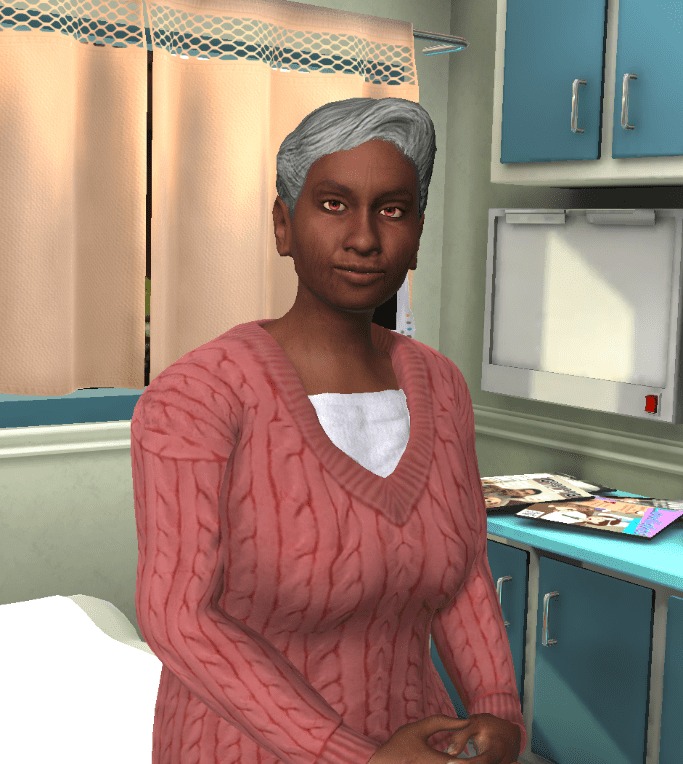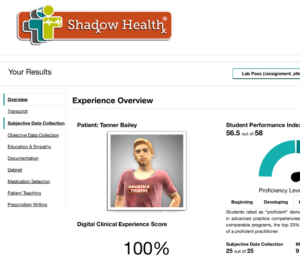Shadow Health Assignments
Anita Douglas Shadow Health Assessment
 Anita Douglas is a 72-year-old African American woman who is featured in both graduate and undergraduate Dynamic Clinical Experiences (DCEs).
Anita Douglas is a 72-year-old African American woman who is featured in both graduate and undergraduate Dynamic Clinical Experiences (DCEs).
In the graduate program, Anita plays a key role in the Advanced Pharmacology and Advanced Diagnostics DCEs.
In the Advanced Diagnostics scenario, Anita has been feeling fatigued and weak for several months, making it difficult for her to do her daily tasks.
Sadly, her symptoms were dismissed as just part of aging, a common mistake in healthcare.
When working with older patients like Anita, nursing students need to be very careful to avoid ageism or unintentional age discrimination. Ageism in healthcare is when older people are not taken as seriously, and their symptoms are wrongly attributed to old age. This can lead to lower quality care, more health problems, and higher healthcare costs. Older people, especially minority elderly individuals like Anita, may face even more discrimination, which could cause delays in treatment and communication problems.

Struggling to meet your deadline?
Get your assignment on Anita Douglas Shadow Health Assessment done by certified MDs and PhDs in the USA. ORDER NOW!
In nursing education, students can learn about patient care simulations where these situations are simulated in a safe environment. In these clinical simulations, students can practice identifying and dealing with age discrimination in nursing. They must be careful not to let implicit bias (unconscious attitudes based on age, race, or gender) affect how they assess a patient. When diagnosing a patient like Anita, nursing students should remember that clinical reasoning in nursing involves carefully considering all possible reasons for a patient’s symptoms. Students need to be mindful of the nursing diagnosis process, making sure they take the time to evaluate all potential causes of Anita’s fatigue, rather than just assuming it’s because of her age.
Ageism and Implicit Bias in Healthcare: A Focus on Elderly Minority Patients
Ageism is a huge issue in healthcare, especially for older adults from minority groups like Anita. Age discrimination in nursing can lead to patients not getting the care they deserve. It can also make health conditions worse and increase the cost of treatment. For example, when Anita’s fatigue was dismissed as just aging, she was not given the chance to explore other possible causes. Cultural competence in nursing is very important here because nursing students need to recognize how ageism and racial bias can impact care. By practicing these skills in nursing education simulation scenarios, students will learn how to overcome these barriers and give fair, unbiased care.
In these simulated cases, nursing students will also learn how to communicate effectively with patients from diverse backgrounds. This includes understanding how cultural differences may affect the way a patient expresses their symptoms or seeks help. By considering these factors in the nursing diagnosis process, students are better prepared to make informed decisions about the patient’s health.
Clinical Leadership in Nursing Education: Managing Patient Care for Older Adults
In the Undergraduate Leadership DCE, Anita is one of five patients that students must manage over three days at Shadow General Hospital. During this experience, students are responsible for patient care, applying leadership skills like task prioritization, delegation, and making ethical decisions. As students work with Anita, they need to assess her condition to make sure she gets the best care possible.
Anita has injured her hip and has been in the hospital for three days. On the third day, Anita expresses a strong desire to walk independently and be discharged. However, her recovery is not yet complete, and her goals have not been fully met. She also asks for information on physical therapy and how to prevent falls in the future. In this scenario, students need to use their nursing leadership skills to make decisions about whether it’s safe for Anita to leave the hospital early. They must think carefully about her well-being and ensure she has the right support before discharge. Nursing advocacy also plays an important role here—students should advocate for Anita’s health and ensure that she gets all the information she needs to make an informed decision.
Key Nursing Skills: Addressing Fatigue, Hip Injuries, and Fall Prevention
Anita’s case highlights some key nursing skills, including fatigue management nursing and how to help older adults recover from injuries like hip fractures. Nursing students must learn how to assess fatigue, a common problem for older adults, and determine whether it’s caused by a treatable condition or if it’s a part of the aging process. 
For example, Anita’s fatigue may be a sign of an underlying medical condition, not just old age. Nursing students must think critically during the clinical reasoning process to make sure they do not overlook potentially serious health issues. Fall prevention in nursing is another important skill. Because Anita has injured her hip, she’s at risk of falling again. Nurses must educate patients about ways to prevent falls and ensure they have access to rehabilitation, such as physical therapy.
The nursing care for hip injuries involves ensuring the patient gets proper treatment and rehabilitation, but also requires patience and support in helping the patient regain mobility. In Anita’s case, students will need to be ready to explain the importance of physical therapy in her recovery and how it can help prevent future injuries.
The Role of Nursing Students in Clinical Simulation Scenarios
Nursing simulation scenarios are an essential part of nursing education. These scenarios allow students to practice their skills in a safe environment before they work with real patients. In the case of Anita, the simulation helps students practice diagnosing and treating older adults, who often have unique needs. Students learn how to manage the complexities of aging, cultural competence, and how to advocate for elderly patients facing challenges like ageism and discrimination in healthcare. Through these simulations, students also practice leadership skills, such as managing multiple patients and addressing ethical dilemmas.
Importance of Physical Therapy in Hip Injury Recovery and Fall Prevention
Physical therapy is essential in helping patients like Anita recover from hip injuries. Nursing students need to learn about the role of physical therapy in nursing care for hip injuries and how it contributes to recovery. Physical therapy can help patients regain strength, mobility, and independence. It also helps prevent future falls, which are a major concern for older adults.
In this scenario, students will need to teach Anita about fall prevention in nursing, showing her how to use assistive devices, avoid tripping hazards, and strengthen muscles to reduce the risk of falling again. As part of her care, nursing students need to be ready to provide advice about geriatric nursing care, which focuses on the special needs of older adults, including managing their fatigue and weakness.
Conclusion
Anita’s case is an important learning experience for nursing students, helping them develop critical skills in nursing education. By focusing on patient care simulations, nursing leadership, and key nursing skills like clinical reasoning and fatigue management nursing, students are prepared to handle the challenges of working with older adults. Through simulations, students learn to navigate complex situations, such as ageism, ethical decision-making, and cultural competence in nursing. These skills are essential for providing the best care to patients like Anita and ensuring they have the support and treatment they need to recover.

Dont wait until the last minute.
Provide your requirements and let our native nursing writers deliver your assignments ASAP.